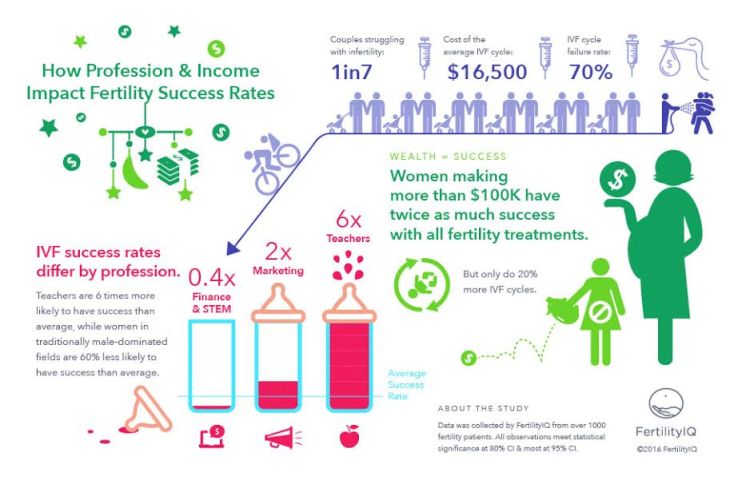Money and teaching might seem at odds with one another but a study out from the Yelp for fertility treatments startup FertilityIQ found both to be the best indicators of success with IVF.
FertilityIQ is one of many pregnancy-focused tech companies busy gathering new information from couples trying to conceive. While part of that information can be utilized for further research to help dispel antiquated ideas, for now, FertilityIQ is focused on discovering which factors contribute to a higher rate of IVF success.
What we know about infertility is surprisingly abysmal, especially for women in their 30s and 40s. We’ve been taught women’s fertility is a ticking time bomb that will “drop off a cliff” after 35 (ha ha, um, no).
The warnings can strike panic and cause couples to seek unnecessary treatment or the wrong treatment. But a lot of these popularly recited ideas about middle-aged women and baby-making actually comes from research done in the 1700s!
On top of worry and murky info, fertility treatments are expensive – $12,000 on average per cycle, with the likelihood of spending for several cycles.
Those hoping to have a baby may find themselves in a desperate situation, spending tens of thousands of dollars without knowing if the treatment they’re getting is even right for them.
Baby data
In a survey of 1,146 initial participants, the startup found couples with more money had a higher rate of success. While that’s not earth-shattering — money means more cycles and higher rates of success over time — the startup also found money was just one of many ways to up your chances.
Women working in teaching, PR and marketing positions — fields generally filled with way more women than men — also had a higher rate of success regardless of income, education or age. Whereas women in male-dominated fields like engineering were found to have a lower rate of success overall.
Girl talk
One possible reason? Women in female-heavy jobs might feel safer talking about wanting to start a family.
“What we found were the women who were teachers were working in environments that were full of women and very supportive of people starting families, which was very different when you talk to female engineers,” says co-founder Deborah Anderson-Bialis.
Anderson-Bialis and her husband Jake (the other half of her co-founding team) say they reached out to about 100 of the survey respondents to get some qualitative analysis.
“A lot of the teachers said they knew other teachers who had been through fertility treatment too and they had a very supportive community,” Deborah said. “IVF has a lot of meetings, sometimes 15 meetings in the same month and approaching your boss for time off is sometimes taboo and most women I know would not feel comfortable having that conversation. Women need that supportive environment.”
IVF is hard enough on couples and doesn’t always work for a multitude of reasons. FertilityIQ is also early days for trying to help couples figure out which doctor or treatment is best for them and the factors leading to the best chance of getting pregnant.
The survey will continue to grow in respondents as FertilityIQ gets bigger and reaches more couples. The takeaway so far is women looking to undergo IVF should seek out jobs that support their choice to have a family if they want to increase their chances of success.

